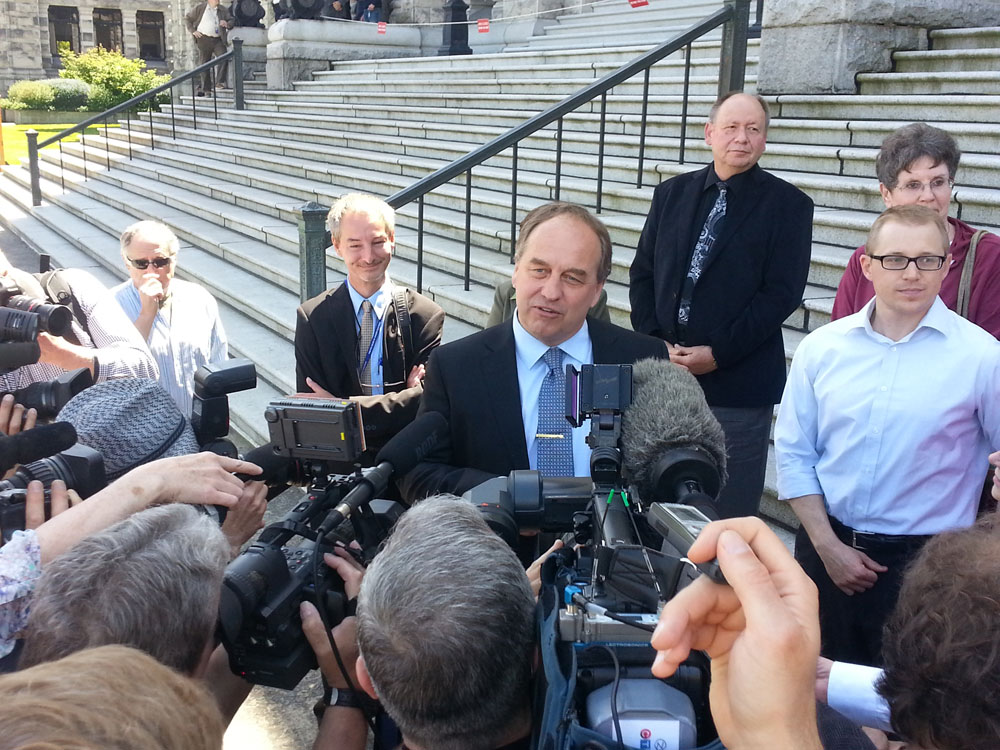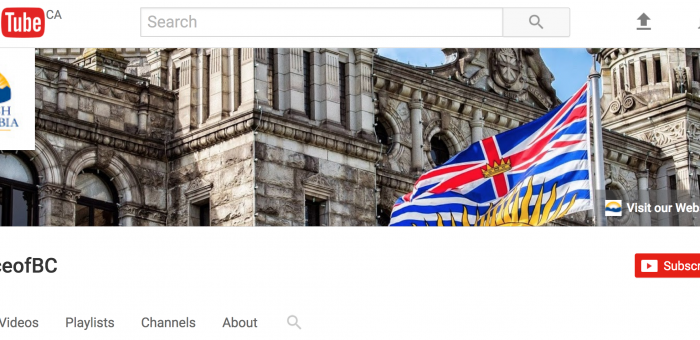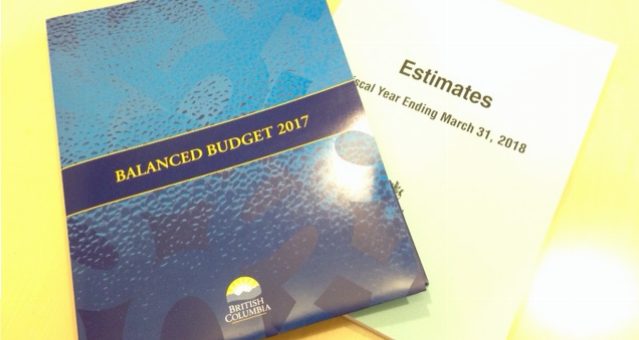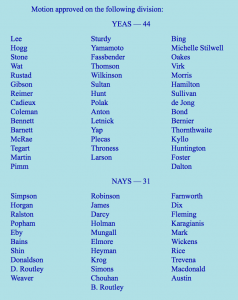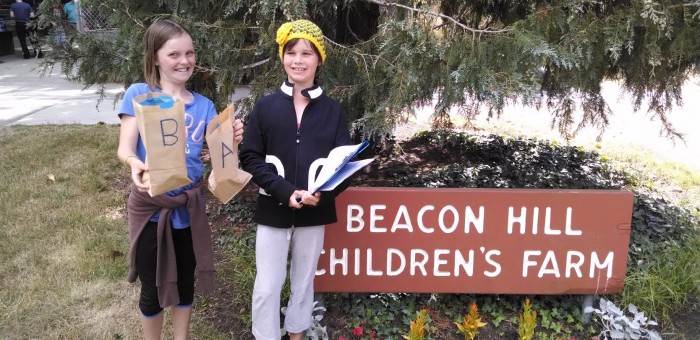Issues & Community Blog - Andrew Weaver: A Climate for Hope - Page 97
Welcoming Elections BC investigation into political contributions
Weaver welcomes Elections BC investigation into political contributions
March 6th, 2017
For immediate release
VICTORIA B.C. – Today Andrew Weaver, Leader of the B.C. Green Party, welcomed the news that Elections BC is investigating potential contraventions of the Election Act.
“I’m thrilled that Elections BC will be investigating the information regarding indirect political contributions and other potential contraventions of the Election Act that were recently made public through the media,” says Weaver, also the MLA for Oak Bay-Gordon Head.
“However, this issue is so serious and of such consequence to British Columbians that I am also asking the RCMP to determine whether there are grounds for a criminal investigation. I will be sending the RCMP a letter this afternoon.”
Media reports over the weekend allege that many donations to the Liberals are made fraudulently or in violation of the Election Act and that the Liberals are encouraging this behaviour by holding cash for access events. The Liberals raised more than $12 million last year, more than any provincial political party in power. The B.C. NDP, which also accepts both corporate and union donations, have also allegedly pressured lobbyists for donations. The NDP have not released fundraising figures for 2016 but raised $3 million in 2015.
“It is crucial that all investigations be done in a thorough and timely manner, and that the results be released before the May 9th election. British Columbians have a right to know, before they cast their ballot, whether the B.C. Liberal Party or the B.C. NDP have broken the law.”
The B.C. Green Party stopped accepting corporate and union donations in September.
“This situation shows clearly the need for wholesale political finance reform in B.C,” says Weaver. “It’s time for British Columbians to take back B.C.”
– 30 –
Media contact
Mat Wright, Press Secretary
+1 250-216-3382 | mat.wright@leg.bc.ca
Bill 7 – 2017: Prevention of Cruelty to Animals Amendment Act
On Thursday last week we debated Bill 7: Prevention of Cruelty to Animals Amendment Act, 2017 at second reading. Every member of the legislature that rose to speak to the bill was in support of it.
Below I reproduce the text and video of my contributions to the debate.
Text of My Speech
A. Weaver: It gives me great pleasure to rise and speak in support of Bill 7, the Prevention of Cruelty to Animals Amendment Act, 2017. Like every member that has spoken before me in the House, I too, obviously, will be voting in support of this bill. It’s a bill filled with good news. But let’s explore some of the details a bit further. This bill provides a framework, which is important, for the licensing and/or registration of commercial breeders of cats and dogs.
Hon. Speaker, as you will know, earlier today I had a remarkable young woman in the Legislature, up there. This young woman was deeply and profoundly concerned about the health and well-being and ability of people to have miniature goats in their backyard. One of the questions, obviously, that I’ll be raising in committee stage is: does this legislation apply to the breeding of miniature goats, for example?
The details of this bill — like what I’ve come to see far too often in my four years — are not actually in the bill but are left for regulation down the road, by order of the Lieutenant-Governor-in-Council. And like every other bill we’re being asked to support here, we’re essentially saying: “Trust us to do what is right.” It really leaves one to wonder whether the government has actually done the necessary groundwork to know how this bill will play out through regulations, rather than just putting in a feel-good bill in the lead-up to an election.
I could actually see this. I can imagine TV commercials, as we enter the NHL playoffs, where we have cute little puppies, with people hugging them and saying: “The B.C. government is here for you. We’re here for you and the puppies.”
Interjections.
A. Weaver: I’ve given them an election suggestion. So you heard it here first, in the B.C. Legislature. The B.C. NDP and the B.C. Greens, of course, could do the same thing and say: “We supported this bill,” as we hug our puppies, in the lead-up to the election.
Truly, this is an important bill. But we’ve had four years in this Legislature to deal with substantive issues like this, and it has taken till pre-election time to actually bring this forward.
While many of the details are actually left to regulation, we do know, for example, that an external agency will be designated by future regulation, and that external agency will administer the system. Lots of vague language there. The agency’s inspectors will be responsible for inspecting and enforcing relevant standards of care. A lot of vague statements there too. Inspectors will be able to apply for a warrant to enter a residence if the owner’s consent is not provided. That’s obviously good.
Breeders found to be engaging in irresponsible practice may be subject to “an administrative action,” including having their licence or registration suspended or cancelled. Operators will be able to request a review or reconsideration of the administrative actions taken against them.
This bill has the support of the SPCA. We know that, as well, after they consulted, and the government consulted, with a variety of stakeholders.
One of the things that I would have liked to have seen in a bill like this — much as I would like to have seen in the Wildlife Act, for example — is where government actually has specific language that states that you are not going to be granted a licence if you have committed an offence against a similar type or piece of legislation in another province.
Now, why I say that is that in the case of wildlife, we have stories coming forth of guide outfitters who, in other provinces, have actually been fined for offences through not appropriately abiding by the rules of the province. Yet in B.C., the Wild West of B.C., it doesn’t matter who you are, we’ll give you a guide-outfitting licence. That is irresponsible, which is why I would have liked to see something a little stronger here in terms of who gets licences.
The essence of the bill falls into two sections: section 4 and section 5. These, actually, are designed, in the first case, to impose prohibitions and duties on operators who must be licensed or registered to engage in a regulated activity. For example, it requires a licence. A regulated operator is to make available to an inspector their licence or a certificate of registration and display the licence or certificate and provide information to the public.
Also, an operator may not charge a fee for providing information to the public or a person who may acquire an animal from an operator. The problem here again…. It has been alluded to by two of my colleagues, the member for Cowichan Valley and the member for Nanaimo–North Cowichan. The member for Cowichan Valley is well-known within this Legislature for looking at legislation under a microscope, peeling through the details with a fine-toothed comb, searching for jiggery-pokery in any form or any fashion.
It’s interesting what he was able to find here. It’s not his. He gives credit to the person who brought it to him, but he received some important information, and that is something I would like to explore. I’m sure the member for Cowichan Valley will as well at committee stage. It’s to the effect that we’re introducing red tape, regulation, for the people already following the law. Those who don’t follow the law are likely not going to be coming, knocking on doors and saying: “Give us a permit. We’re going to actually display that permit so that everyone can tell that we’re not actually following the law.” The underground aspect of those kind of puppy factories that we’re introducing legislation for….
It’s not clear to me that this is actually being dealt with, or the extent to which there are some proactive measures taken by the government to seek out such people. Do they simply have to wait until somebody makes a complaint and then follow the legislation subsequent to receiving such a complaint?
As I mentioned, section 5 is the other meaty part of this bill. That sets out the procedures for applying for a licence or registration and provides inspection power for enforcing the licensing or registration scheme. It also provides a designated agency to establish a minister and enforce a licensing or registration scheme and for training and oversight of employees as licensing officers, reviewing officers and licensing inspectors.
Again, you know, when you read the bill, there’s nothing really of any substance to criticize. There are a few concerns that my friend and colleague from Cowichan Valley has noted, but this is really a bill about protecting animals. I’ve heard each and every person here speak to this. What I noted in their speeches is every person talked about the love of their dog that they had when they were a child. But let me tell you: I didn’t have a dog as a child. I didn’t have a dog as a child because I was allergic to dogs, and my mother was allergic to dogs. So I can’t speak with passion to the love of my dog. However, when I left home, my parents….
Interjection.
A. Weaver: I did watch Old Yeller. The member for Peace River South pointed out that Old Yeller evokes passion in anyone who watches it. It was a very disturbing movie to me when I was a child to see Old Yeller get hydrophobia and start to turn against the young boy who once was his soulmate, his partner. That was troubling. Perhaps Old Yeller had actually got that from a puppy farm. We’re so lucky today that that will be regulated by this particular government. This government is actually stepping in to do what Old Yeller’s little boy couldn’t do, which is protect the future of their puppy from the puppy farm and the diseases they get.
My parents did have a lovely dog, and we have several of them. They were non-allergic dogs, so they were able to have them when I was older. They were delightful pets. They were passed down from family to family because others got old and they couldn’t take care of the dogs.
I remember my parents’ dog’s first name. It was Lisitsa. Lisitsa is a Ukrainian name. I believe it means fox. I could be wrong, but I believe it meant fox. It was a lovely name for a very vibrant dog that kept my parents company. We had a subsequent dog. It was Lisa. It was another dog, very similar. It, too, was loved by my parents. Even thought it was hypoallergenic, I couldn’t enjoy the pleasures of dogs. So while I understand, having watched Old Yeller, the importance of this bill, I could never actually feel it personally like the member for North Vancouver–Seymour or the member for Cowichan Valley — all these heartfelt stories. The member for Nanaimo–North Cowichan with his husky.
I missed out in childhood. Maybe I should be seeking therapy over that, after listening to these speeches here today.
Interjections.
A. Weaver: Some of of the members opposite feel the same way.
Anyway, the reason I bring that up, of course, is this is a very important bill. I’ll be speaking in support of it. I have. I will be following up in committee stage. It is important that we treat our pets properly.
But there are so many other issues facing the people of British Columbia. Why is this government not bringing in legislation to deal with affordability issues? Why is this government not dealing with a very problematic aspect of our society, which is the liability of pet owners for the behavior of their pets?
On the order paper, you’ll see some bills there. I spoke last session about the Animal Liability Act and changes. This time I’ll speak about the Community Charter so that we can actually ensure that not only the breeders of pets but also the owners of pets are held accountable for their treatment and ownership of the pets that they have under their care.
This is important. The government is missing that. It’s not dealing with this. It’s going with the election ad during hockey games, holding puppies and saying: “We are here for you, British Columbians. We are here to support your puppies.” I mean, really. There are so many other issues we should be debating. We should be talking about health care. We should be talking about education. There are so many bills. What about poverty? What about social welfare rates? Why aren’t we seeing legislation here? Why are we focusing on a number of bills that are brought forward?
The last session of this government being in office. We’re dealing with the Budget Measures Implementation Act and a lovely bill to protect puppies. We all agree it’s a lovely bill. There are a couple of other bills that we’re getting, but there’s nothing. This is a government that is so lost, so out of touch with the issues facing British Columbians that they’re pulling bills off the shelf that they’ve had to fill the time rather than actually standing up and dealing with the prevailing issues in British Columbia.
The fact that…. This time four years ago we had been promised 100,000 jobs, a $100 billion prosperity fund, a $1 trillion increase in GDP, elimination of the PST, thriving schools and hospitals, three LNG plants and all of us wealthy in their lead-up to the last election. Where is it? It’s not here. Why aren’t we talking about that?
Are we going to see them taking out ads in the hockey games, hugging puppies and saying: “We’re here for you, British Columbians; we’re here for your puppies”? Or are they going to stand up and say: “We’re sorry we misled you for the last four years by promising you nonsense, despite the fact that the lone B.C. Green MLA in this Legislature said it wasn’t going to happen in 2012, said it wasn’t going to happen in 2013, said it wasn’t going to happen in 2014, said it wasn’t going to happen in 2015”?
Around that time, the minister of hot air and gas pointed out that I was going to eat my words, and he was looking forward to that time. He knew more than I did because he meets with these people. Two years later here we are. Where is it? It’s misleading.
What are we doing? We’re debating here the Prevention of Cruelty to Animals Amendment Act. Well done, B.C. government. Well done dealing with those issues that are affecting everyday life for British Columbians here. Let’s talk about puppies. Give me a break. Obviously, I support this bill, but there are so many other bills that we should be talking about. That is what we should be spending time here, and that’s why I’m going to sit down now, because I hope we get to those other issues and to talk about them as we come forward.
Video of My Speech
British Columbian’s very own Alternate News Channel!
Today in the legislature I questioned the Minister of Advanced Education on what I perceive to be a wasteful use of taxpayers resources. In the United States, the Trump news channel bills itself as the world’s first media outlet dedicated to positive news about Donald Trump. Here in B.C., we have our own. It’s called the Province of B.C. Channel.
You’ll see from the discussion below that this channel has been a colossal failure. Yet it is clear that a substantial amount of money has been spent producing these professionally produced videos. My questions were designed to find out how much these videos were costing the taxpayer.
My questions followed three that the Leader of the Official Opposition posed to the same Minister regarding pre-election advertising using taxpayers’ money. The Minister responded each time by berating the BC NDP for their record in the 1990s. That is why when I stood up I started off by saying that I thought it was 2017 not 1998.
Below I reproduced my exchange with the Minister in video and text format. I was quite disappointed with his answers.
Video of Question Period
Question
A. Weaver: Last time I looked, it was 2017 and not 1998.
In the United States, the Trump news channel bills itself as the world’s first media outlet dedicated to positive news about Donald Trump. Here in B.C., we have our own. It’s called the province of B.C. channel.
This alternate news outlet is not drawing an awful lot of viewers, and we have to wonder why it exists. For example, of the 39 videos that have been posted, 37 have been complete flops. The B.C. jobs plan video got 148 views in three weeks.
The video of the Premier responding to the federal government’s marine strategy was viewed 118 times in three months. A Health announcement of $5 million on spending to boost paramedic response to B.C.’s overdose crisis got 135 views in two months.
The government of B.C.’s channel even produced a one-minute video of the Premier highlighting her in the Hong Kong Terry Fox Run. It got, in one year, 448 views.
My question is this, through you to the minister: how much is this channel costing the people of British Columbia, and why does it exist?
Minister’s Response
Hon. A. Wilkinson: The member for Oak Bay–Gordon Head constantly talks about being evidence-based. Well, let’s talk about some evidence.
First of all, the reason why the videos remain available is so that members of the public and the media can hold us to account for what has been said in the past.
Secondly…
Interjections.
Madame Speaker: Just wait.
Hon. A. Wilkinson: …the member seems to think that the only vehicle for people to learn in the world today is to go dig around in the government website for videos. He forgets that the public don’t consume their news that way these days. They find it through social media, through television — through other forms of communication.
That’s why we have been able to see the increases that we have. The property transfer tax exemption campaign ran for three months and saw a 34-fold increase in traffic in registrations for the service. That’s evidence, Madame Speaker.
Supplementary Question
A. Weaver: The minister clearly doesn’t actually know his file because this is not on the ministry websites. It’s their own province of B.C. news channel.
You know, the minister also says people get their news from other areas. This clearly is a large waste of taxpayers’ money. They’re professionally produced videos put out to the public that aren’t being used. As an example, my right-to-roam legislation, which I put forward, has received 100,000 views in less than a week.
My question, back to the minister, is: why are they doing it, who is paying for it, how much is it costing, and when are they going to take it down or actually make it accessible to a more diverse array of people?
Minister’s Response
Hon. A. Wilkinson: Well, given the quality of work we do and the quality of communication, we don’t need the Green Party bot to make 100,000 hits on our site.
We are not ashamed to say that we have introduced new programs that need to have the level of public awareness that is provided by a variety of communications channels. We maintain those communications vehicles for public scrutiny and for media scrutiny as time goes by. We are certainly not ashamed to have advertised and promulgated the information about the opioid awareness campaign, the property transfer tax exemptions, the single-parent employment initiative, the property tax deferment.
These are critical to British Columbians, as they go through their lives. They are entitled to know that they exist, they are entitled to get access to them, and they are particularly entitled to know that we run a balanced budget that provides $1 billion in MSP rebates. People are entitled to collect that rebate, and the member opposite should be proud of us for doing so.
A Brief Response to the BC Budget
Today in the legislature I rose briefly to respond to the BC Liberal’s pre-election budget. I had originally been scheduled to rise earlier in the week but the cold that I had (which caused me to lose my voice) precluded me from speaking for 30 minutes then. Unfortunately, according to the standing orders, a vote on the budget had to be called this morning. And seeing as some of the speakers took a little longer than we expected, time ran out before a number of us could rise to speak.
Nevertheless I had a little over one minute to outline why I was not supporting the budget. A more thorough response will be given when I speak at second reading of the Budget Implementation Act, the Act that implements the measures contained in this year’s budget.
As one might expect, the budget vote passed 44-31 with the BC NDP and I voting against it.
Below I reproduce the text and video of my response.
Text of My Response
I do recognize that according to standing orders, I have very little time. I just rise quickly to state that obviously, I do not support this budget. This budget is filled with political calculations in an election year.
For example, the MSP premium, which is highlighted in this budget, has a big cut. It’s something you still have to apply for. It’s something that won’t be in effect until 2018. It doesn’t actually eliminate MSP. It still retains the burdensome administrative overhead. There are many, many other examples here.
It’s a budget without a vision. It’s a budget from a government that’s lost touch with the people. It’s a budget from a government that didn’t recognize that its windfall came from an out-of-control real estate sector in Vancouver. Instead of using that money to help those who have been affected by it, through affordable housing, it’s putting it to boutique tax credits for their friends and relatives.
With that, I’ll say that this budget is not something I can support. I look forward to standing with my colleagues on this side of the House and voting against it very shortly.
Video of my Response
Paying tribute to a remarkable young woman
Today in the legislature I had the distinct pleasure of hosting Jillian McCue on a job shadow. Jillian is the remarkable young woman who spent three years trying to get Saanich to allow her to have miniature goats in her back garden. I took the opportunity to make a two minute statement highlighting her inspirational achievements.
Below I reproduce the text and video of my speech.
Text of my Statement
A. Weaver: I’d like to pay tribute to an inspirational young woman who I have the distinct honour of hosting on a job shadow today. Her name is Jillian McCue, a 13-year-old grade eight student at Gordon Head Middle School.
I first met Jillian in April 2013 during a meet-and-greet that I was attending in the lead-up to the last election. Midway through the event, Jillian, then only nine, entered and requested that I ask the audience to sign her petition. I didn’t know who she was or what the petition was about, so I suggested she make the pitch directly. It was compelling, grounded in evidence, and eloquently and passionately delivered. Jillian was setting out to change the fact that Saanich municipal bylaws did not permit miniature goats to be kept in backyards, and she convinced every single person in the room to sign the petition.
She’d done her homework. She learned that in 2007, Seattle city council approved keeping miniature goats as pets. She undertook her own research to disarm the potential criticism that goats would be smelly. Participants in her goat-poo smell study were asked to smell two bags: one containing dog poop and the other containing goat poop. They were then asked to rate the smelliness on a Likert scale of 1 to 5. Her survey data confirmed her hypothesis. On average, dog droppings smell twice as bad as goat poop.
Armed with her research, a petition signed by 132 people in her neighbourhood and well-structured PowerPoint slides, Jillian made a presentation to Saanich council. She was peppered with questions that she easily handled, and Saanich subsequently referred the matter to no less than three separate committees. So began the grueling municipal approval process.
Jillian persevered.
She presented to each of the committees and fielded many questions. She responded to numerous media requests. Three years later — yes, that’s three years — Saanich finally agreed to allow a pilot project to be undertaken. Jillian was able to obtain two miniature goats.
After watching Jillian navigate the complexities of municipal politics, I’m convinced that her determination, skills and ability to take on big challenges could allow her to achieve one of her life goals. That is to be the Prime Minister of Canada.

